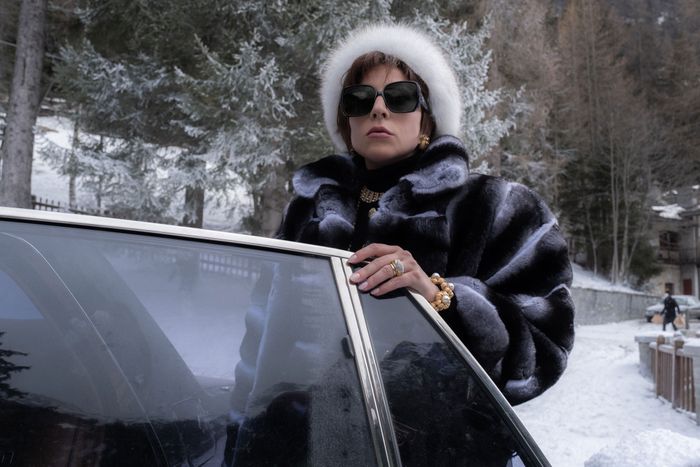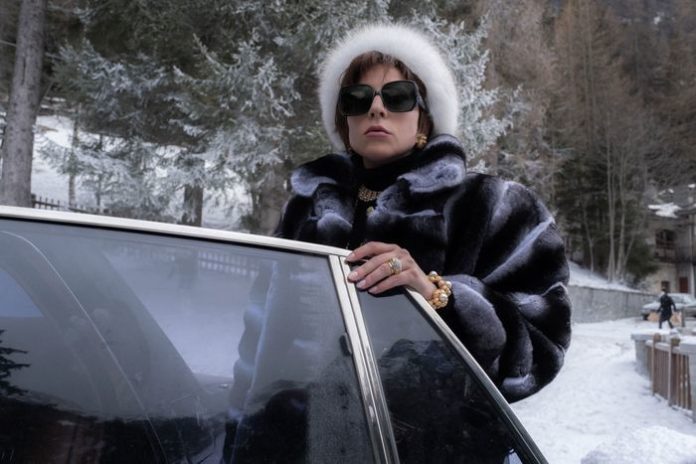
Some movies leave you wanting to talk about the quality of the acting, but with House of Gucci, it feels more appropriate to discuss the amount. Even spread over an exorbitant two hours and 37 minutes, Ridley Scott’s second film in two months has more acting by volume than any other theatrical release this year. Its most prolific source is Jared Leto, who’s been encased in latex to play Paolo Gucci, the corduroy-loving lesser scion who tries to launch his own Gucci fashion line. It’s the rare performer who manages to out-big Al Pacino, but in scene after scene, Leto makes the acting legend, cast as Paolo’s father, Aldo, look downright restrained in his choices and his interpretation of an Italian accent. Pacino will do things like tell Jeremy Irons, playing Aldo’s brother and Gucci co-owner Rodolfo, “You need to deal with your saaahn!” and it comes across as a totally normal line-reading compared to Leto’s later singsong declaration that “My father is 70, he’s no spring CHEEECKEN.” When the two are together onscreen, their indulgences actually block each other out in an effect that’s probably a lot like the technology behind noise-canceling headphones. It frees your gaze to wander over the settings they’re in, which are usually rife with the kind of high-end ugliness that only the very rich can achieve.
Gucci is a label built on a carefully concocted air of tasteful luxury, but House of Gucci is a movie that mostly understands itself to be high-end trash. No one onscreen has a better grasp of this than Lady Gaga, who plays Patrizia Reggiani, the hot-blooded upstart who marries into the family and starts Lady Macbeth-ing it up, only to end up arranging a hit on her ex-husband, Maurizio (Adam Driver), after their divorce expels her from under the aegis of the green and red. There’s a touch of Nomi Malone to Gaga’s performance, which is fueled by a barely disguised ravenousness, a desire to eat the world in one determined bite. Patrizia is voluptuously vulgar, with her wiggle dresses and ever-more-voluminous hair, the daughter of a trucking entrepreneur whose eyes all but bug out of her head when the shy law student she meets at a party turns out to be heir to a fashion empire. Her calculations are so visible to us, if not to Maurizio, who never stood a chance, that her character achieves a contrary sort of guilelessness. Patrizia is so open about what she wants that it feels unfair to refer to her actions as schemes, and her desire for Maurizio can’t be separated from her desire for the money and power he represents. Gaga is wildly watchable in the role, broad but unwinking, an absolute scream, and the movie only really makes sense when it’s about her.
It’s not always about her, unfortunately. The screenplay for House of Gucci, which was written by Becky Johnston and Roberto Bentivegna, based on a book by Sara Gay Forden, has the shapeless sprawl of something with many juicy details but no center. It begins as Patrizia’s tale, with her delightful seduction-as-bulldozing of Maurizio. Driver, who’s scientifically never been hotter than he is as the bashful idealist, makes for a hilariously unconvincing overlooked bookworm who can’t believe someone would ask him out. Rodolfo, who assesses Patrizia with an arid accuracy (Irons looks like he’s undergoing a new form of mummification that involves being wrapped in cashmere), initially cuts Maurizio out of his will for marrying Patrizia, only to slowly relent due to Aldo’s influence. A class climber causing chaos in the mansions of Milanese fashion aristocracy is the stuff of a good story. So is a reluctant child of that aristocracy overcoming his distaste for the fallacies of class to become the most ruthless spendthrift of them all. So is the balancing act of a luxury label trying to sell exclusivity while actually only making money off affordable accessories. But House of Gucci tries to be all of these movies without committing to any one perspective, never able to decide what it’s really about.
What it’s really about, of course, is rich people being awful to one another, a genre of entertainment that speaks to our era more than superheroes do. We may want to eat the rich, but we also like to watch them, and our appetite for dramas set in the world of the one percent hasn’t decreased, even as the use of guillotine GIFs rises. An unfortunate fact about the wealthy is that they get to puppet the world while also owning a lot of pretty things, qualities that have traditionally played very well onscreen. Shows like Succession and movies like House of Gucci try to square these contradictions by providing a kind of escapist schadenfreude, giving their audiences a chance to peer into the existences of the unfathomably well-off while also reassuring them that to actually be one of the superrich is to be miserable. The constant machinations and heartless power struggles are fun to watch, but also serve as a kind of moral prophylactic, a way of investing in the competitions onscreen without being in danger of investing in the characters.
Maybe that’s why Gaga’s character fades from view for a while, as though the movie loses its resolve, unable to bridge the endearing outsider and the murderess. But she represents the most interesting, if half-explored, idea that House of Gucci has to offer, because once she’s allowed into the hallowed halls of the Gucci clan, she buys into the myths of exclusivity and aristocracy more than Maurizio — who scoffs about his grandfather being a bellhop — ever did. Incensed to discover fakes being sold on the sidewalks of New York, she’s told that “quality is for the rich,” but that it’s a good thing that everyone wants to own a bit of Gucci anyway, even if it’s a knockoff. It’s the kind of cannily observed moment that makes the promise of House of Gucci so much more tantalizing than the actual movie itself. It opts for fun over quality, but there’s no reason it couldn’t have had both.








